Teaching Digital Literacy
历年专升本英语作文真题及参考范文
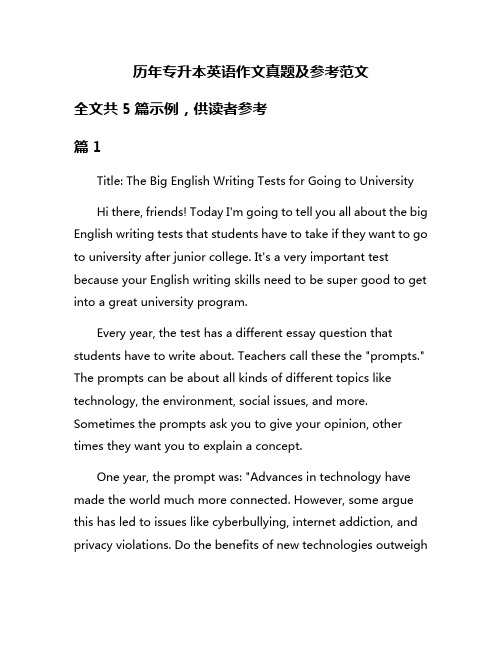
历年专升本英语作文真题及参考范文全文共5篇示例,供读者参考篇1Title: The Big English Writing Tests for Going to UniversityHi there, friends! Today I'm going to tell you all about the big English writing tests that students have to take if they want to go to university after junior college. It's a very important test because your English writing skills need to be super good to get into a great university program.Every year, the test has a different essay question that students have to write about. Teachers call these the "prompts." The prompts can be about all kinds of different topics like technology, the environment, social issues, and more. Sometimes the prompts ask you to give your opinion, other times they want you to explain a concept.One year, the prompt was: "Advances in technology have made the world much more connected. However, some argue this has led to issues like cyberbullying, internet addiction, and privacy violations. Do the benefits of new technologies outweighthe drawbacks? Provide relevant reasons and examples to support your position."Wow, that's a really complex question, right? The teachers want to see if you can write a long, detailed essay with a clear stance, good organization, and lots of supporting examples. A sample excellent response could look something like this:"With the rise of the internet, social media, and smartphones, technology has transformed how people communicate and access information. While these innovations have numerous benefits, including ease of global communication and access to unlimited knowledge, they have also created new issues that need to be carefully addressed.On the positive side, technology allows people from different continents to instantly connect through video calls, messaging apps, and social media platforms. This fosterscross-cultural understanding and maintenance of relationships across long distances. Moreover, the wealth of online information has made learning extremely accessible and opened doors to self-education. With a few taps on a smartphone, one can find explanations for any concept or translations to any language.However, the digital age has also ushered in some significant drawbacks. Cyberbullying, where individuals face harassment, embarrassment, or threats online, is a growing problem worldwide. The anonymity of the internet emboldens bullies to act cruelly without fear of repercussions. Additionally, many people struggle with internet and smartphone addiction, neglecting face-to-face interaction, exercise, and other essential aspects of life. Privacy is also a major concern, as companies can track our online activities and data can be hacked or leaked.Ultimately, while technology has greatly enriched our lives, we must be cognizant of its negative impacts and take steps to mitigate them. Teaching digital literacy, cyber-ethics, andself-regulation from a young age is crucial. Governments and companies should also prioritize robust cybersecurity measures and stronger data privacy laws. By proactively addressing these issues, we can maximize technology's benefits while minimizing the drawbacks."Phew, that's a really detailed and well-structured response, don't you think? The writer clearly states their position, provides lots of relevant examples for both the pros and cons, and offers some solutions at the end. That's exactly the kind of essay that can get a top score!Another practice prompt from a few years ago was: "An individual's intelligence is highly dependent on their environment and upbringing. To what extent do you agree or disagree with this statement? Use relevant reasons and examples to support your response."For a question like this, you'd need to define what intelligence means, discuss the roles of both genetic and environmental factors with specific examples, and then present a nuanced conclusion weighing the impacts of nature versus nurture.As you can see, these university admission prompts require very strong English skills - excellent vocabulary, clear and logical organization, the ability to take a stance and support it with evidence. The graders will look at your grammar, spelling, and writing mechanics too.I know it sounds really tough, but don't get discouraged! If you practice writing lots of sample essays, learn advanced vocabulary and transition words, and get feedback from your teachers, you can develop the skills to write an awesome exam essay. Just take it step-by-step.Well, that's all I have to share about the big English writing tests for now. They're definitely challenging, but I know you canwork reallyhard to get prepared. Fighting for that university admission! Let me know if you have any other questions.篇2My Big Bro Goes to University!Wow, I'm so excited because my big brother Jimmy is going to university next year! He's been working super hard to get good grades and prepare for the big entrance exam. My mom and dad are really proud of him. I can't wait until I'm old enough to go to university too!Jimmy has been stressing out a lot about the English part of the exam. He says the writing section is always really tough. You have to write a whole essay in just an hour or so! That sounds impossible to me. How can anyone write that much in such a short time?Jimmy showed me some sample essay prompts from previous years' exams. They were all really wordy and had lots of big vocabulary words I didn't understand. One was about how technology affects our lives. Another asked what qualities make a good leader. Those seem like really hard topics to write a long essay about, especially with a time limit.To get ready, Jimmy has been practicing writing timed essays at home. He sets a timer for 60 minutes and picks a prompt, then writes and writes until the timer goes off. After, he has my mom or dad read over his practice essays and give him feedback. They always end up covered in red pen marks with notes about grammar, organization, vocabulary, and all that stuff.I tried doing a timed writing once when Jimmy left his stuff out, just to see how hard it was. I couldn't even fill up one page in an hour! Jimmy said not to feel bad though, that it takes a ton of practice to get good at timed essay writing. He's been doing it for like two years to get ready.Jimmy let me read through some of the top-scoring sample essays from previous years that his English teacher gave him. They were really impressive! The vocabulary was so advanced, with words I'd never heard of. And the ideas and examples they used were just brilliant. No way could I write anything close to that level, even if I had a whole week.Jimmy's English teacher said the key things the graders look for are a clear thesis statement, solid examples and evidence to support the main ideas, good organization intointro/body/conclusion paragraphs, correct grammar, andappropriate vocabulary and writing style. Whew, that's a lot to keep in mind!I guess writing at a university level is just really hard. You have to know so much advanced vocabulary and grammar rules. And you need amazing critical thinking skills to come up with a well-reasoned, logical argument to answer the essay prompt. No wonder Jimmy has been stressed! This entrance exam writing seems brutally difficult.Still, I'm cheering Jimmy on and I know he's going to do great. He's been putting in the hard work, writing practice essays pretty much every day. His writing skills have improved so much from all the feedback from teachers and doing revision after revision.When Jimmy finally takes that exam in a few months, I just know he's going to wow the graders. His essay is going to be overflowing with fancy vocabulary, have an airtight thesis with supporting examples, perfect grammar, and be beautifully organized. The university is sure to accept him after reading his amazing entrance essay!And in a few years when it's my turn, maybe Jimmy can give me some tips and coach me on writing the perfect university application essay too. I'll be able to learn from my amazing bigbro who conquered the terrifying entrance exam writing section. Wish me luck, because I'm definitely going to need it! Writing at that level is no easy feat.篇3Every year, many students who have completed junior college want to upgrade to a university degree program. To do this, they need to take an English examination that includes an essay writing section. The topics can be quite challenging! Let me tell you about some of the previous essay prompts and how students responded to them.Last year, one of the topics was "Describe a person who has had a major influence on you and explain how they influenced your life." Sounds pretty hard, right? But one student wrote a really great essay about her grandfather. She started by painting a picture of her grandpa with his kind smile, twinkly eyes, and loving hugs. Then she explained how he had taught her so many valuable lessons through his words and actions. He showed her the importance of being honest, working hard, and never giving up on her dreams. His endless optimism and resilience inspired her to stay positive even when facing difficulties. The student's vivid descriptions and personal examples made the essay very engaging and heartfelt.Another previous prompt asked students to "Discuss an issue that is important to you and propose a solution." One student chose to write about environmental pollution. He opened his essay by vividly depicting a beautiful natural scenery being ruined by garbage, smog, and oil spills. He made readers feel upset and concerned about the severe damage caused by human activities. The student then proposed ideas like stricter regulations, better recycling systems, and educational campaigns. He also urged individuals to make daily choices that are eco-friendly. With a passionate tone and logical reasoning, the essay effectively raised awareness about this critical issue.Yet another oldie but goodie prompt was "What goals have you set for yourself and why are they important to you?" A student explained her dream of becoming a doctor who could help cure deadly diseases. She described watching her grandmother suffer from cancer, which motivated her to pursue medical research. Despite the challenges of long years of tough study, she was determined to use her skills and knowledge to ease the pain of patients and their families. Her clear purpose and mature perspective on the value of this career really made the essay inspirational.As you can see, the key to a strong composition is focusing on personal experiences, real-world examples, and authentic feelings. Whether writing about an influential person, an important issue, or future goals, students should aim to connect with readers through vivid details, clear logic, and heartfelt reflections. The best essays make readers care about the topic in a whole new way.Of course, proper grammar, vocabulary, and organization are also crucial for a polished piece. But as long as students write from the heart and soul, their passion will shine through. So don't be intimidated by those scary essay prompts! With creativity and practice, anyone can craft responses that will impress the examiners.篇4My Favorite English Writing TopicsHi there! My name is Emma and I'm in 5th grade. I love learning English and practicing my writing skills. My English teacher Ms. Johnson always gives us fun writing prompts and today I wanted to share some of my favorites from the past few years.One topic that was really cool was "My Dream Vacation." For that one, I wrote all about how I want to go to Hawaii someday and swim with the dolphins and go snorkeling to see the pretty fish and coral. I described the amazing beaches with their soft white sand and the tall palm trees swaying in the breeze. I even looked up some Hawaiian words to include, like "aloha" for hello and "mahalo" for thank you. My teacher said I did a great job painting a picture with vivid details.Another awesome prompt was "If I Could Be Any Animal." I chose to be a golden retriever because they are just the sweetest, fluffiest pups ever! I wrote about how I would get tons of belly rubs and go for walks in the park, chasing squirrels and playing fetch. I also talked about being super loyal to my owner and always being excited to greet them after school or work with lots of licks and tail wags. Ms. Johnson loved my imaginative take on the topic.Last year we had to write about "My Favorite Family Tradition." I described how my whole family gets together for a big Thanksgiving feast every November. I went into detail about my mom's delicious pumpkin pie recipe that's been passed down for generations. I also mentioned how we go around the table and each say what we're thankful for that year. It's such a niceway to spend quality time together. The teachers always enjoy reading about fun cultural traditions.Just last month, the writing prompt was "What I Want to Be When I Grow Up." I wrote all about my dream of becoming a teacher, just like Ms. Johnson. I talked about how I would decorate my classroom with lots of colorful posters and have a cozy reading nook. I'd come up with engaging lessons to help kids fall in love with learning. I'd be patient, kind, and make my students feel special every day. My essay explained how inspiring Ms. Johnson is to me.Well, those are some of the highlights from writing for English class over the past few years. I really enjoy the creative prompts because it lets me use my imagination and write about topics I'm passionate about. Practicing my English writing skills is so important for becoming a strong communicator. Who knows, maybe I'll be asked to write the university entrance exam essay someday! I'll just put my pencil to the paper and let my ideas flow.篇5English Exam Essays For Upgrading to Bachelor's ProgramsHey there! My name is Tommy and I'm going to tell you all about the English essays for the big exam if you want to go from an associate's degree to a bachelor's degree program. It's a pretty important test, but don't worry, I'll explain it in a way that's easy to understand.Every year, the exam has different essay topics, but they are usually about some big issues or ideas that grown-ups think are important. The essays test how well you can write in English and if you can share your thoughts and opinions clearly.Last year, one of the essay prompts was about technology and how it impacts our lives. The question asked if technology is more helpful or more harmful overall. That's a tricky one because technology definitely makes some things easier, like learning new things or keeping in touch with friends and family. But it can also be bad, like if people get addicted to their phones or computers and don't spend time in the real world.For an essay like that, you'd want to make sure you have a clear thesis statement that picks one side - either that technology is more helpful or more harmful. Then you'd want to give some examples and reasons to support your point of view. Maybe you could talk about how smartphones help us learn by having lots of information at our fingertips. Or you could discussthe negative impacts of too much screen time on things like health and social skills.The year before that, there was an essay prompt about the environment. The question asked what we can do as individuals to better protect the planet. For this kind of essay, you'd want to show that you understand the importance of taking care of the Earth and that there are actions we can all take to have a positive impact.You could write about simple things like recycling, saving energy by turning off lights, or taking shorter showers to conserve water. Or you could discuss bigger actions like protesting to make companies and the government do more to fight climate change and pollution. The key is to give clear, specific examples of steps people can take, not just general statements about the environment being important.Another common type of essay topic is about education and learning. One past prompt asked, "What is the most important factor for students to get a good education?" An essay like this lets you share your perspective on what really matters most for helping kids learn and do well in school.Some possible points you could make are that having great teachers is the biggest factor. Or that parental support andinvolvement is crucial. Or that students themselves have to be motivated and work hard. You could also argue that school facilities, class sizes, access to technology, and other resources are the key elements that impact how well students can learn.No matter what examples and reasons you choose, the important thing is to develop your main idea thoroughly and support it with plenty of explanations, details and evidence from your own experiences and observations about school.Those are just a few examples of past English essay topics, but I hope they help give you an idea of what to expect and how to approach the writing. The main things to remember are:Read the question carefully and make sure you understand what it's asking.Take a clear stance or position - don't try to discuss both sides equally.Support your main idea with plenty of specific details, examples and reasons.Organize your thoughts into an introduction, body paragraphs and a conclusion.Use proper spelling, grammar and essay formatting.If you practice essays on different topics and follow those tips, you'll be super well-prepared to write a great essay on whatever prompt comes up on the big exam day. Writing a solid essay is an important way to demonstrate your English skills as you work towards your bachelor's degree goals.Well, that's about all the insights I can share from my vast experience as a wise and scholarly elementary school student. Just kidding! But I hope this gives you a helpful overview of the kinds of English essays you might see on the upgrading exam. Work hard, believe in yourself, and you'll do great! Let me know if you have any other questions.。
提高数字素养的方法 英语作文

提高数字素养的方法英语作文Enhancing Digital Literacy: Empowering Individuals in the Digital Age.Digital literacy has become an indispensable skillset in the rapidly evolving technological landscape that shapes our modern world. As individuals navigate the vast expanse of digital information and tools, it is essential to develop a comprehensive understanding of digital technologies and their applications. This essay explores various effective methods to enhance digital literacy, empowering individuals to fully participate and thrive in the digital era.1. Immersion through Technology Integration:Regular engagement with digital technologies is a cornerstone of digital literacy development. By actively using computers, smartphones, and the Internet, individuals can firsthand experience the functionalities andapplications of these devices. Encouraging hands-on exploration and practical usage provides a tangible foundation for understanding digital concepts.2. Formal Education and Training:Formal education and training programs play a crucial role in imparting digital literacy skills. Institutions offer dedicated courses, workshops, and certification programs tailored to specific digital domains. These programs provide structured learning opportunities, covering topics such as digital communication, data analysis, and cybersecurity.3. Digital Skill Development Platforms:Numerous online platforms offer interactive courses, tutorials, and assessments designed to enhance digital skills. These platforms cater to learners of all levels, providing personalized learning paths and gamified experiences. By engaging with these platforms, individuals can supplement their formal education and acquire specificdigital competencies.4. Peer Learning and Knowledge Sharing:Collaboration and knowledge sharing among peers is a powerful means of digital literacy development. Joining online communities, participating in forums, and connecting with experts in digital fields facilitate the exchange of ideas, best practices, and troubleshooting techniques.5. Digital Inclusion Initiatives:Digital literacy initiatives aimed at bridging the digital divide are crucial for ensuring equitable access to technology and its benefits. These initiatives provide training, mentorship, and resources to underserved communities, empowering individuals to overcome barriers to digital participation.6. Critical Digital Literacy:Beyond technical skills, critical digital literacyinvolves the ability to evaluate, analyze, and synthesize digital information. Encouraging individuals to question the accuracy, biases, and credibility of online content fosters informed decision-making and prevents the spread of misinformation.7. Media Literacy and Information Seeking:Media literacy empowers individuals to understand the role of media in shaping perceptions, values, and beliefs. By teaching media analysis techniques and promoting responsible information seeking, individuals can navigate the vast media landscape with discernment and draw informed conclusions.8. Cybersecurity Awareness:In the digital age, cybersecurity awareness is paramount to protect personal information, devices, and online accounts. Regular education and training programs should emphasize the importance of strong passwords, phishing scams, malware prevention, and data protectionpractices.9. Digital Identity Management:Managing one's digital identity across multiple platforms and social media requires responsible digital stewardship. Individuals should understand the privacy settings, data sharing practices, and reputation management techniques associated with their online presence.10. Continual Learning and Adaptation:Digital technology is constantly evolving, making it essential for individuals to adopt a mindset of continual learning. Staying abreast of emerging trends, experimenting with new tools, and seeking opportunities for professional development ensures that digital literacy remains relevant and effective.Conclusion:Enhancing digital literacy is a multifaceted endeavorthat requires a combination of immersion, formal education, peer learning, and ongoing adaptation. By embracing these methods, individuals can develop the skills and knowledge necessary to navigate the digital world with confidence, unlock opportunities, and contribute meaningfully to the digital landscape. As the digital age continues to shape our lives, digital literacy is an indispensable tool for empowering individuals and ensuring their fullparticipation in the 21st century.。
网络虚假信息现象英语作文
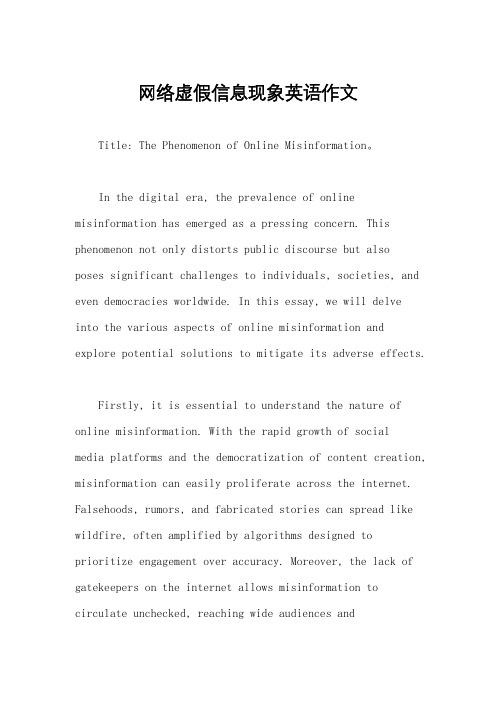
网络虚假信息现象英语作文Title: The Phenomenon of Online Misinformation。
In the digital era, the prevalence of online misinformation has emerged as a pressing concern. This phenomenon not only distorts public discourse but alsoposes significant challenges to individuals, societies, and even democracies worldwide. In this essay, we will delveinto the various aspects of online misinformation and explore potential solutions to mitigate its adverse effects.Firstly, it is essential to understand the nature of online misinformation. With the rapid growth of socialmedia platforms and the democratization of content creation, misinformation can easily proliferate across the internet. Falsehoods, rumors, and fabricated stories can spread like wildfire, often amplified by algorithms designed toprioritize engagement over accuracy. Moreover, the lack of gatekeepers on the internet allows misinformation to circulate unchecked, reaching wide audiences andinfluencing public opinion.One of the primary drivers of online misinformation is the monetization of clicks and views. Clickbait headlines and sensationalized content are designed to attract attention and drive traffic to websites or social media profiles, regardless of the veracity of the information presented. In this profit-driven ecosystem, the incentive to produce sensational and misleading content outweighs the commitment to truth and accuracy.Furthermore, the echo chamber effect exacerbates the spread of misinformation online. Social media algorithms are designed to show users content that aligns with their existing beliefs and preferences, creating echo chambers where false information can thrive unchecked. In these echo chambers, individuals are less likely to encounter opposing viewpoints or fact-checking mechanisms, reinforcing their preconceived notions and biases.The consequences of online misinformation are far-reaching and profound. Misinformation can erode trust ininstitutions, undermine democratic processes, and even incite violence and social unrest. From conspiracy theories to health misinformation, the impact of false information on public health, societal cohesion, and individual well-being cannot be overstated.Addressing the problem of online misinformation requires a multifaceted approach. Firstly, technological solutions such as improved algorithms and fact-checking tools can help identify and flag false information more effectively. Platforms must prioritize accuracy and transparency in their content moderation policies, ensuring that users are not exposed to harmful misinformation.Education also plays a crucial role in combating online misinformation. Teaching digital literacy skills, critical thinking, and media literacy can empower individuals to discern fact from fiction and navigate the complex landscape of online information more effectively. By equipping people with the tools to evaluate sources, verify information, and recognize bias, we can foster a more informed and resilient society.Additionally, fostering a culture of responsible online behavior is essential in combating misinformation. Encouraging users to fact-check information before sharing, promoting civil discourse, and holding purveyors of misinformation accountable can help stem the tide of falsehoods online. Ultimately, combating online misinformation requires collaboration between governments, technology companies, civil society organizations, and individual users.In conclusion, the phenomenon of online misinformation poses significant challenges in the digital age. From its origins in profit-driven clickbait to its amplification in echo chambers, misinformation undermines the foundations of informed public discourse and threatens the fabric of democratic societies. However, by implementing technological solutions, promoting digital literacy, and fostering responsible online behavior, we can mitigate the impact of online misinformation and build a more resilient information ecosystem for the future.。
关于digital literacy的英文书
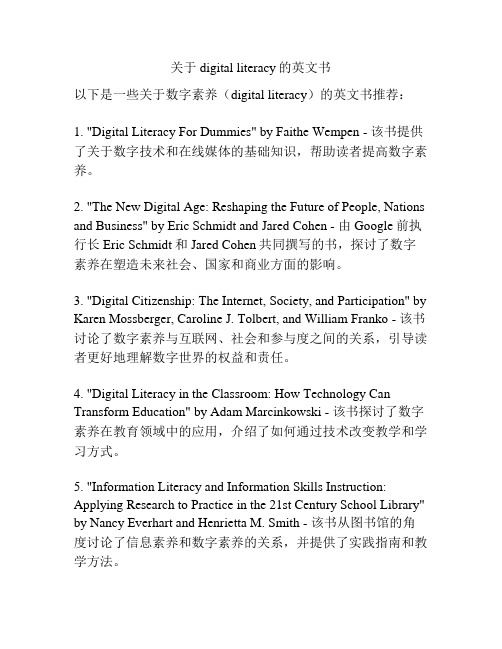
关于digital literacy的英文书以下是一些关于数字素养(digital literacy)的英文书推荐:1. "Digital Literacy For Dummies" by Faithe Wempen - 该书提供了关于数字技术和在线媒体的基础知识,帮助读者提高数字素养。
2. "The New Digital Age: Reshaping the Future of People, Nations and Business" by Eric Schmidt and Jared Cohen - 由Google前执行长Eric Schmidt和Jared Cohen共同撰写的书,探讨了数字素养在塑造未来社会、国家和商业方面的影响。
3. "Digital Citizenship: The Internet, Society, and Participation" by Karen Mossberger, Caroline J. Tolbert, and William Franko - 该书讨论了数字素养与互联网、社会和参与度之间的关系,引导读者更好地理解数字世界的权益和责任。
4. "Digital Literacy in the Classroom: How Technology Can Transform Education" by Adam Marcinkowski - 该书探讨了数字素养在教育领域中的应用,介绍了如何通过技术改变教学和学习方式。
5. "Information Literacy and Information Skills Instruction: Applying Research to Practice in the 21st Century School Library" by Nancy Everhart and Henrietta M. Smith - 该书从图书馆的角度讨论了信息素养和数字素养的关系,并提供了实践指南和教学方法。
digital literacy作文

digital literacy作文Digital literacy is an essential skill in today's technology-driven world. It refers to the ability to find, evaluate, and utilize digital information effectively and efficiently. In the era of information explosion, digital literacy is crucial for individuals to navigate through the vast amount of online content and make informed decisions.数码素养在当今这个科技驱动的世界中是一项必不可少的技能。
它指的是有效和高效地找到、评估和利用数码信息的能力。
在信息爆炸的时代,数码素养对于个人来说是至关重要的,因为它让人们能够在海量的在线内容中导航,并做出明智的决策。
First and foremost, digital literacy enables individuals to access and utilize digital information for various purposes, such as research, communication, and entertainment. With the ability to effectively navigate through online resources, individuals can expand their knowledge, connect with others, and stay updated with the latest developments in their fields of interest.首先,数码素养能让个人为了各种目的访问和利用数码信息,比如研究、交流和娱乐。
digitalliteracy英语作文
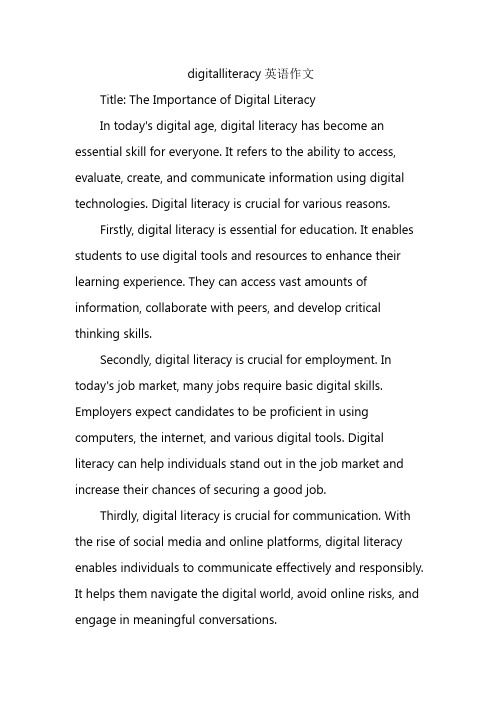
digitalliteracy英语作文Title: The Importance of Digital LiteracyIn today's digital age, digital literacy has become an essential skill for everyone. It refers to the ability to access, evaluate, create, and communicate information using digital technologies. Digital literacy is crucial for various reasons.Firstly, digital literacy is essential for education. It enables students to use digital tools and resources to enhance their learning experience. They can access vast amounts of information, collaborate with peers, and develop critical thinking skills.Secondly, digital literacy is crucial for employment. In today's job market, many jobs require basic digital skills. Employers expect candidates to be proficient in using computers, the internet, and various digital tools. Digital literacy can help individuals stand out in the job market and increase their chances of securing a good job.Thirdly, digital literacy is crucial for communication. With the rise of social media and online platforms, digital literacy enables individuals to communicate effectively and responsibly. It helps them navigate the digital world, avoid online risks, and engage in meaningful conversations.In conclusion, digital literacy is an important skill that everyone should possess. It enhances education, improves employment prospects, and facilitates effective communication. Therefore, it is crucial to promote digital literacy among all individuals, regardless of their age or background.。
高校教师数字素养与教学能力提升专题工作坊研修总结
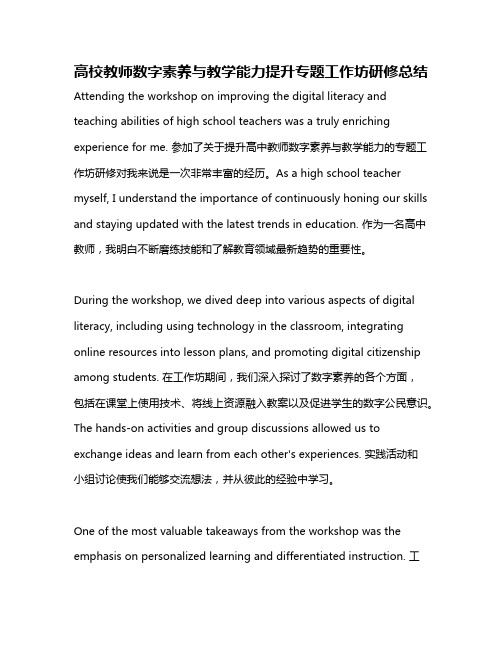
高校教师数字素养与教学能力提升专题工作坊研修总结Attending the workshop on improving the digital literacy and teaching abilities of high school teachers was a truly enriching experience for me. 参加了关于提升高中教师数字素养与教学能力的专题工作坊研修对我来说是一次非常丰富的经历。
As a high school teacher myself, I understand the importance of continuously honing our skills and staying updated with the latest trends in education. 作为一名高中教师,我明白不断磨练技能和了解教育领域最新趋势的重要性。
During the workshop, we dived deep into various aspects of digital literacy, including using technology in the classroom, integrating online resources into lesson plans, and promoting digital citizenship among students. 在工作坊期间,我们深入探讨了数字素养的各个方面,包括在课堂上使用技术、将线上资源融入教案以及促进学生的数字公民意识。
The hands-on activities and group discussions allowed us to exchange ideas and learn from each other's experiences. 实践活动和小组讨论使我们能够交流想法,并从彼此的经验中学习。
关于尊重隐私的作文英语

关于尊重隐私的作文英语Title: The Importance of Respecting Privacy。
Privacy is an essential aspect of human dignity and autonomy. It encompasses the right to control one's personal information and to maintain boundaries between oneself and others. In today's interconnected world, where information can easily be shared and accessed, respecting privacy becomes increasingly crucial. This essay delves into the significance of respecting privacy, examining its implications on individuals, relationships, and society as a whole.First and foremost, respecting privacy fosters trust and mutual respect in relationships. Whether it's between friends, family members, or colleagues, acknowledging and honoring each other's privacy demonstrates a fundamental understanding and acceptance of boundaries. When individuals feel that their privacy is respected, they are more likely to feel secure and valued in theirrelationships. Conversely, breaches of privacy can lead to feelings of betrayal and resentment, eroding trust and damaging relationships irreparably.Furthermore, respecting privacy is essential for safeguarding individual autonomy and freedom. Each person has the right to control their personal information and make decisions about what they choose to disclose to others. Without this autonomy, individuals may feel vulnerable and exposed, unable to fully express themselves or pursue their interests without fear of judgment or intrusion. Respecting privacy empowers individuals to maintain their independence and agency over their lives, promoting a society thatvalues and protects individual freedoms.In addition to its interpersonal implications, respecting privacy also has significant societal benefits.A society that values privacy is one that upholdsprinciples of fairness, justice, and respect for human rights. When institutions and governments respect citizens' privacy rights, they demonstrate a commitment to protecting individual liberties and preventing abuses of power.Conversely, unchecked surveillance and infringement on privacy rights can lead to authoritarianism and undermine the very foundations of democracy.Moreover, respecting privacy is essential for fostering innovation and creativity. In an environment where individuals feel safe to explore new ideas and express themselves freely, creativity flourishes. When people are confident that their privacy will be respected, they are more likely to engage in creative pursuits and contribute to the collective knowledge and culture. Conversely, a lack of privacy can stifle creativity and innovation, as individuals may fear the consequences of expressing unconventional or controversial viewpoints.Despite its importance, respecting privacy faces numerous challenges in today's digital age. Theproliferation of social media, online surveillance, and data collection practices has made it increasinglydifficult to maintain control over personal information. In many cases, individuals may unwittingly consent to the collection and dissemination of their data without fullyunderstanding the implications. Additionally, the rise of technologies such as facial recognition and biometric data collection poses new threats to privacy rights, raising concerns about surveillance and civil liberties.Addressing these challenges requires a multifaceted approach that involves both individual actions and collective efforts. Educating individuals about their privacy rights and the importance of safeguarding personal information is crucial. This includes teaching digital literacy skills and promoting responsible online behavior. Additionally, governments and institutions must enact robust privacy laws and regulations that protectindividuals from unwarranted surveillance and data exploitation. Transparency and accountability are essential to ensuring that privacy rights are respected and upheld.In conclusion, respecting privacy is fundamental to preserving human dignity, autonomy, and freedom. It is a cornerstone of healthy relationships, a safeguard against abuses of power, and a catalyst for innovation and creativity. In an increasingly interconnected world, wherepersonal information is constantly at risk of being compromised, it is more important than ever to uphold the principles of privacy and protect individual rights. By recognizing the significance of privacy and taking proactive measures to respect and preserve it, we can build a more just, equitable, and inclusive society for all.。
2022-2023学年辽宁省名校联盟考试高二下学期6月月考英语试题

2022-2023学年辽宁省名校联盟考试高二下学期6月月考英语试题1. National ForecastAs snow tails off in northern New England and upstate New York today, snow showers will extend to the southwest and into the Ohio Valley as colder air settles in. Most of the snow showers will be light but a few spots can be hit with a quick coating to an inch. The Southeast can expect dry and cool conditions as sunshine returns.Showers will exit in South Florida and the Keys early on. Much of the plains will be dry. However, an Alberta clipper storm will spread light snow from Montana to the Dokotas. A stronger clipper storm with heavier snow will travel farther south over the Central states thisweekend.Most areas west of the Rockies will be dry as Santa Ana winds kick up in Southern California. Idaho is likely to share in the next clipper storm’s snow on Friday.Metropolitan Forecast(New York)TODAY Windy and milderHigh 48. A storm will depart to the east with clouds breaking for some sunshine during the day. It will be occasional windy with blows up to 40 miles per hour throughout the afternoon.TONIGHT Partly cloudyHigh 47. There will be less wind as high pressure moves in from the west. Clouds will break late at night and it will remain dry. Temperatures will remain above normal for late January. TOMORROW Mostly cloudy, coolerHigh 41. It will be cloudy as high pressure shifts to the east. Wind will blow at 6 to 12mph. Temperatures will end up within a couple degrees of normal for this time of the year. SATURDAY Continuous sunshineHigh 49. With high pressure nearby, the day will be dry with no wind. There will be sunshine through the afternoon. Temperatures will be above normal.SUNDAY Mostly cloudySome sunshine early Sunday will give way to clouds. Late showers cannot be ruled out.High 50. MONDAY Mostly cloudyMonday will be cooler with clouds and some sunshine. High 46.1. Which of the following statements is true?A.Many areas will be greeted by snow.B.Sunshine will return to the southwest.C.There will be continuous wind these days in New York.D.The highest temperature in New York will appear on Saturday.2. What day is it today?A.Wednesday. B.Thursday. C.Friday. D.Saturday.3. Where is the text probably taken from?A.A newspaper. B.A travelC.A magazine. D.A research paper.brochure.2. Until 13, Parker Liautaud was an ordinary kid. That changed after he met polar explorer Robert Swan. They began an email correspondence which turned into a friendship that eventually saw the then 14-year-old invited to join a trip to the Antarctic. He said yes almost instantly. Friends and family, to whom he’d so far shown no particular interest in outdoor activities,particularly polar ones, were thrown into total confusion. He ate lots of chicken, spent a long time in the gym,and proved them wrong.The following year, Liautaud put forward a more ambitious plan: to become the youngest-ever person to go to the North Pole. He found a new partner, Doug Stoup,and through a mixture of charm and luck raised the roughly $150,000 needed for the record attempt. Then disaster struck. The early months of the year, when the two set out, were among the warmest on record. The North Pole, which is essentially a GPS location on a constantly-floating collection of ice sheets,became virtually inaccessible, surrounded by pieces of uncovered ocean.A trip which had been intended to raise awareness of melting ice caps was delayed by melting ice caps. “We would get up, battle through these difficult conditions for 150 hours, then wake up the next morning and find that we were further away from the Pole than we’d started the previous morning,”he said. After 14 days’ trying, they admitted defeat.Liautaud came home and decided to try again the next spring. Conditions were cold but perfect, and he and Stoup reached the Pole in no time. While it might not have made Liautaud the youngest North-Poler, the success did fulfil his original intention, giving him a platform to continue promotion against climate change, through his campaigning website. His view is that it’s his generation that must make the greatest effort to reduce carbon emissions. He has already contributed to research projects carried out by the International Atomic Energy Agency and will soon set up two stations to record weather data.1. How did Liautaud’s family react to his decision to go to the Antarctic?A.They made fun of it. B.They were puzzled about it.C.They turned a deaf ear to it. D.They tried to talk him out of it.2. What prevented Liautaud and Stoup from reaching the North Pole?A.The severe weather. B.The lack of ice sheets.C.The failure of equipment. D.The poor financial support.3. Why was Liautaud determined to go to the North Pole?A.To push his physical limits.B.To become an Internet celebrity.C.To support environmental protection.D.To finish a research project for his website.4. Which of the following words can best describe Liautaud as a young man?A.Demanding. B.Cooperative. C.Generous. D.Responsible.3. A few days ago, the Brooklyn Nets basketball player Ben Simmons donated a basketball court to Machang township in Southwest China’s Guizhou Province during a ceremony. Simmons has visited China several times since he was young. He has been deeply touched by the Chinese people’s warmth and friendly feelings toward him and their enthusiasm for the basketball.Impressed by the news that basketball competitions had been held in Guizhou at a village with their own “Village Basketball Association(VBA)”, Simmons de cided to donate a basketball court to the village during the Chinese New Year Basketball Competition in January. After conducting a survey, he set up the basketball court in Machang township in Gui’an New Area in the hope that it would create more opportunities for young fans to play basketball.In the mountainous village of Machang, there are no huge electronic screens or advertisements at basketball games, but they can still be thrilling thanks to local players’ love for the sport. These players later became a hit in China and even went global. A recent final competition attracted 30,000 viewers on site and more than 1 billion viewers online.Comparatively, the NBA boasts the best players in the world, top-class basketball gyms and professionally made commercials, so its exciting games draw fans around the world. NBA and the “VBA”are thousands of miles apart, but their games are equally striking, fueling thousands of fans’ enthusiasm. Both focus on a common interest of basketball fans in the U. S. and China and their shared pursuit of sports and a better life.Although Machang township lacks modern sports facilities, the local people’s love for basketball remains strong. So Simmons’ donation will surely help improve the village’s situation to a certain extent, but more importantly, it will bring people separated by the Pacfe Ocean closer through this sport.1. Why did Simmons donate a basketball court to Machang township?A.To attract global attention to the village.B.To participate in more local competitions.C.To show his passion for local people’s lifestyle.D.To encourage more young people to play basketball.2. What makes the local basketball games exciting?A.Players’ professional skill.B.The large number of viewers.C.Players’ passion f or basketball. D.Powerful promotion of the games.3. How is paragraph 4 developed?A.By giving examples. B.By making comparisons.C.By providing comments. D.By drawing conclusions.4. What is the suitable title for the text?A.China’s “VBA” Becomes a HitB.NBA Player Does Charity in Chinese VillageC.Village Players Compete in International CompetitionsD.Shared Love of Basketball Links NBA and China’s“VBA”4. Mobile learning has been proven to improve learning outcomes for students of all ages. With the expansion of online authorship(作者), publishing has become increasingly more accessible to all people. This is a positive thing for people who are looking to create content and connect with others globally. However, this access to online authorship also means that there is more content to be sorted when looking for reliable resources. Therefore, when applying mobile lessons, teaching digital literacy(素养) is essential to ensure that students obtain accurate information and are not being misled on the Internet.As technology changes, teachers must first receive updated training to model positive digital citizenship. Training for teachers is also important when educational technology is used in the classroom. Teachers who understand how these applications and websites work can assist students who may be struggling. Especially in a time of mobile learning, being able to answer students’ questions about technology clearly can be the difference between success and failure of a student. Along with teacher training, students should also receive thorough and in-depth guidance about how to use these educational technologies. If students are not taught how to use these devices and applications, they will struggle with their academics. Unfortunately, when mobile learning is the only option, some students can easily become overwhelmed, which may lead them to give up on certain technologies because they do not understand them, which can negatively impact their learning outcomes. Students need thorough digital literacy training to avoid this problem.Students don’t just need digital literacy training for class. Students also need to develop these skills to be successful in the workplace. 21st-century workplaces rely heavily on technology; even obtaining a job in the 21st-century will prove difficult without digital literacy.1. Which of the following is one benefit of students’ having digital literacy?A.Getting easy access to writers worldwide.B.Publishing content on the Internet freely.C.Effectively obtaining the exact information.D.Collecting all resources from foreign websites.2. What is Paragraph 2 mainly about?A.Methods of giving digital lessons.B.Students’ gains from mobile learning.C.Need for updating teaching content constantly.D.Significance of training teachers’ digital literacy.3. What does the underlined word “overwhelmed” in Paragraph 3 probably mean?A.Helpless. B.Focused. C.Busy. D.Overjoyed.4. What does the writer want to imply by mentioning the 21st-century?A.Technology is developing at a fast speed.B.People have more employment opportunities.C.Digital literacy contributes to students’ future career.D.Students are more likely to succeed in workplaces.5. Confidence is an important element of success. However, as we grow older, we start to lose our confidence because of the life-altering changes we go through. We don’t always have as much of it as we need. 1Learn something new and interesting. If you’ve lost your confidence, learning something new and interesting can help you regain your sense of competence. Of course, the key to gaining confidence in something new is to put in the time and practice. 2 The more knowledgeable you become, the more confident you’ll feel contributing to conversations and trying new things.3 When we compare ourselves to others, we feel jealousy (嫉妒) toward them. As we experience more of these negative feelings, we also tend to feel worse about ourselves. When you find you don’t have achieved what they do, remind yourself that everyone has their own pace,and life isn’t always a competition.Surround yourself with positive and supportive people. We should pay close attention to how other people make us feel-if someone always leaves us sad and disappointed after hanging out, then it might be time to separate ways with him. 4 When we have people in our lives who love and support us unconditionally, we feel confident and secure in who we are.Don’t let perfectionism or your past get in the way. For most people, the pressure to be perfect locks them up and makes them too afraid to even try. In fact, failure isn’t always as bad as you think. 5 It’s crucial to take the first step and just do your best even if’it’s not perfect right away. Learn from past struggles and use them to move forward.6. Five boys, aged 11, were playing at Clove Lakes Park. Then they _________ an open drain(排水管)and decided to get in. After _________ for about 10 minutes in it, the boys realized that they were _________ and decided to call 911.“We’re _________ in the drain. We can’t find the way out,” one boy said to the 911 operator.Following this call, firefighters were immediately se nt off to the area where the boys said they’d entered the drain. Rescue teams found the boys’ _________ backpacks and jackets at the mouth of the drain.Rescuers _________ to enter the drain. But the tunnel’s 40-inch opening _________ to about 30 inches further in, making it too small for the _________ to get in. So they decided to find another _________ .While the rescuers were searching, the 911 operator instructed the boys to scream as loud as they could to catch their __________ .Luckily,this strategy proved __________ , and rescuers were able to locate and enter a manhole(检修孔)to the boys’ __________ . Rescuers used ropes to __________ themselves down into the drain and found all five boys. __________ , none of the kids were injured.In total, the boys spent roughly an hour in the drain, moving a quarter mile through the dark with a __________ for guidance.1.A.searched for B.got through C.settled in D.came across2.A.wandering B.approaching C.resting D.examining3.A.tired B.lost C.ignored D.locked4.A.covered B.tied C.hurt D.stuck5.A.selected B.damaged C.abandoned D.stolen6.A.attempted B.managed C.hesitated D.agreed7.A.reserved B.narrowed C.enlarged D.extended8.A.boys B.operators C.cleaners D.rescuers9.A.entrance B.drain C.park D.team10.A.eyes B.attention C.breath D.lessons11.A.legal B.basic C.successful D.strange12.A.whisper B.silence C.laughter D.scream13.A.lower B.guide C.hide D.shape14.A.Similarly B.Naturally C.Thankfully D.Originally15.A.rope B.phone C.map D.speaker7. 阅读下面短文,在空白处填入1个适当的单词或括号内单词的正确形式。
技术对教育的影响英语作文
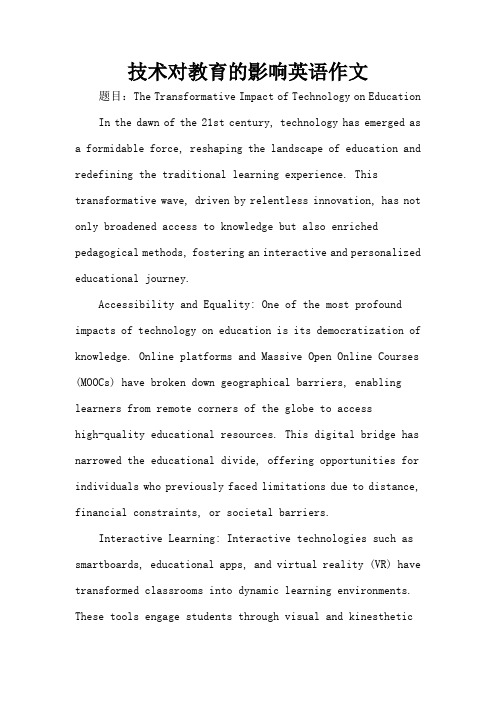
技术对教育的影响英语作文题目:The Transformative Impact of Technology on Education In the dawn of the 21st century, technology has emerged as a formidable force, reshaping the landscape of education and redefining the traditional learning experience. This transformative wave, driven by relentless innovation, has not only broadened access to knowledge but also enriched pedagogical methods, fostering an interactive and personalized educational journey.Accessibility and Equality: One of the most profound impacts of technology on education is its democratization of knowledge. Online platforms and Massive Open Online Courses (MOOCs) have broken down geographical barriers, enabling learners from remote corners of the globe to accesshigh-quality educational resources. This digital bridge has narrowed the educational divide, offering opportunities for individuals who previously faced limitations due to distance, financial constraints, or societal barriers.Interactive Learning: Interactive technologies such as smartboards, educational apps, and virtual reality (VR) have transformed classrooms into dynamic learning environments. These tools engage students through visual and kinestheticlearning, making complex concepts more tangible and understandable. Gamification of learning, for instance, uses game elements to motivate students, enhancing theirproblem-solving skills and fostering a love for learning.Personalized Learning: Adaptive learning systems, powered by artificial intelligence (AI), are capable of tailoring educational content to each student’s individual needs, pace, and learning style. By analyzing performance data, these systems can identify areas where a student excels or struggles, providing customized feedback and resources to support their unique learning journey. This personalized approach not only enhances academic performance but also promotes self-directed learning.Collaboration and Networking: Technology has facilitated global collaboration, allowing students to work together on projects with peers from different cultures and backgrounds. Platforms like Google Classroom and Microsoft Teams encourage teamwork and facilitate communication, preparing students for the interconnected nature of the modern workplace. Furthermore, social media and educational forums enable students to connect with experts and peers worldwide, fostering a global learning community.Continuous Learning: The rise of e-learning and microlearning platforms has promoted a culture of lifelong learning. Adults seeking skill upgrades or career changes can conveniently access courses and certifications online, keeping them competitive in an ever-evolving job market. This flexibility empowers individuals to pursue personal interests and professional development at their own pace and convenience.However, amidst these advantages, it is crucial to acknowledge the potential downsides, such as the digital divide that still exists in some communities, and the need for students to develop critical thinking skills amidst an ocean of information. Ensuring equitable access to technology and teaching digital literacy are imperative to harnessing technology's full potential in education.technology has undeniably revolutionized education, infusing it with flexibility, accessibility, and interactivity. As we continue to navigate this digital age, it is our responsibility to leverage these advancements wisely, nurturing a generation of learners equipped not just with knowledge, but also the skills to adapt and innovate in an increasingly complex world.。
如何提高自己的数字素养来学习英语英语作文
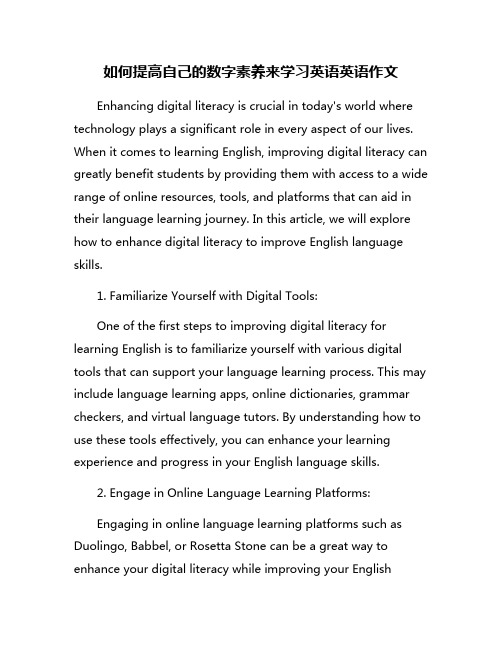
如何提高自己的数字素养来学习英语英语作文Enhancing digital literacy is crucial in today's world where technology plays a significant role in every aspect of our lives. When it comes to learning English, improving digital literacy can greatly benefit students by providing them with access to a wide range of online resources, tools, and platforms that can aid in their language learning journey. In this article, we will explore how to enhance digital literacy to improve English language skills.1. Familiarize Yourself with Digital Tools:One of the first steps to improving digital literacy for learning English is to familiarize yourself with various digital tools that can support your language learning process. This may include language learning apps, online dictionaries, grammar checkers, and virtual language tutors. By understanding how to use these tools effectively, you can enhance your learning experience and progress in your English language skills.2. Engage in Online Language Learning Platforms:Engaging in online language learning platforms such as Duolingo, Babbel, or Rosetta Stone can be a great way to enhance your digital literacy while improving your Englishlanguage skills. These platforms offer interactive lessons, quizzes, and activities that can help you practice reading, writing, listening, and speaking in English.3. Utilize Digital Resources:There are a plethora of digital resources available online that can aid in learning English, such as podcasts, YouTube channels, online articles, and e-books. By utilizing these resources, you can expose yourself to authentic language usage and improve your language skills in a practical and engaging way.4. Participate in Virtual Language Exchange Programs:Virtual language exchange programs, such as Tandem or HelloTalk, provide opportunities to practice English with native speakers from around the world. By participating in these programs, you can improve your language skills through real-life conversations and cultural exchange, while enhancing your digital literacy by navigating these online platforms.5. Stay Updated with Digital Trends:As technology continuously evolves, it is essential to stay updated with the latest digital trends and advancements that can support your language learning journey. Whether it be exploring virtual reality language learning experiences or utilizingAI-powered language learning tools, staying informed about digital innovations can help you enhance your digital literacy and improve your English language skills.In conclusion, enhancing digital literacy is key to improving English language skills in today's digital age. By familiarizing yourself with digital tools, engaging in online language learning platforms, utilizing digital resources, participating in virtual language exchange programs, and staying updated with digital trends, you can enhance your digital literacy while progressing in your English language learning journey. Embracing technology as a tool for language learning can open up new opportunities and enable you to achieve your language learning goals more effectively.。
2024年广东二模英语作文范文
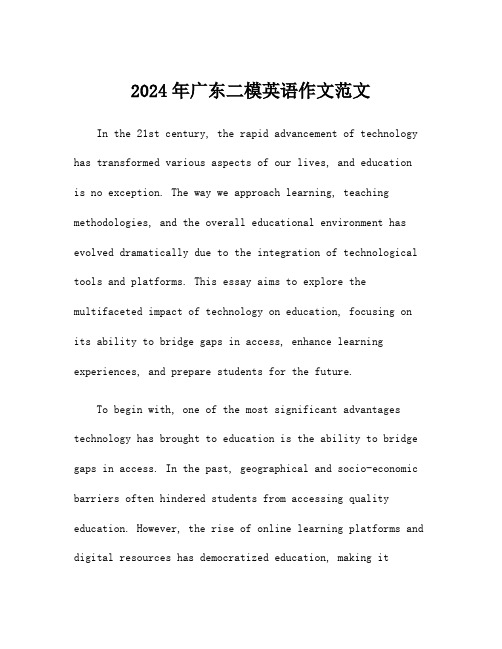
2024年广东二模英语作文范文In the 21st century, the rapid advancement of technology has transformed various aspects of our lives, and educationis no exception. The way we approach learning, teaching methodologies, and the overall educational environment has evolved dramatically due to the integration of technological tools and platforms. This essay aims to explore the multifaceted impact of technology on education, focusing on its ability to bridge gaps in access, enhance learning experiences, and prepare students for the future.To begin with, one of the most significant advantages technology has brought to education is the ability to bridge gaps in access. In the past, geographical and socio-economic barriers often hindered students from accessing quality education. However, the rise of online learning platforms and digital resources has democratized education, making itaccessible to a wider audience. Students from remote areas can now attend virtual classes, access a plethora of educational materials, and participate in global discussions without the constraints of physical distance.Moreover, technology has played a crucial role in providing educational opportunities for marginalized communities. Initiatives such as providing tablets or laptops to underprivileged schools, alongside access to the internet, have empowered students who previously lacked resources. A report from UNESCO highlights that technology cansignificantly improve learning outcomes for disadvantaged groups. For instance, online courses and mobile learning applications have allowed these students to learn at their own pace, countering the negative effects of traditional classroom limitations.Furthermore, the integration of technology into education has led to the development of personalized learningexperiences. Traditional teaching methods often adopt a one-size-fits-all approach, which can leave some students behind while others may not be challenged enough. With the help of artificial intelligence and data analytics, educators can now tailor lessons to meet the individual needs of each student. Adaptive learning technologies can assess students' performance in real time and provide customized resources, ensuring that every learner progresses according to their ability.In addition to enhancing accessibility and personalization, technology has revolutionized the way knowledge is delivered and consumed. Gone are the days when students relied solely on textbooks for information. Today, multimedia resources such as videos, podcasts, andinteractive simulations contribute to a richer learning experience. For example, platforms like Khan Academy and Coursera offer a diverse range of courses that incorporatevisual aids, hands-on practices, and quizzes, making learning more engaging and effective.Moreover, technology fosters collaboration among students, enriching their educational journey. Tools such as discussion forums, collaborative documents, and online project management platforms enable students to work together, regardless of their physical location. This collaboration not only enhances their understanding of the subject matter but also develops essential soft skills such as communication, teamwork, and problem-solving. In a world that increasingly values collaboration in the workplace, these skills are invaluable assets for future careers.However, it is important to acknowledge that theintegration of technology in education also poses challenges. One significant concern is the digital divide—the gapbetween those who have easy access to digital technology and those who do not. While technology can bridge gaps in access,it can also create new forms of inequality. Students who lack access to reliable internet or modern devices may find themselves at a disadvantage compared to their peers. Addressing this issue is crucial to ensure that all students, regardless of their background, can benefit from technological advancements in education.Another challenge is the potential for distraction that comes with technology. With the vast array of information and entertainment available online, students may find itdifficult to focus on their studies. Social media and gaming can divert attention away from educational goals. To combat this, educators must incorporate strategies that enhance digital literacy, helping students navigate the online landscape responsibly while maintaining their focus on academic pursuits.Additionally, there are concerns regarding the quality of online content. The internet is rife with misinformation, andstudents may struggle to discern credible sources from unreliable ones. Educators have a responsibility to teach students how to critically evaluate information and develop research skills that will serve them both in academicsettings and in their future careers.Despite these challenges, the benefits of technology in education are undeniable. As we move forward, it is imperative that educators, policymakers, and communities work together to harness the potential of technology while addressing its shortcomings. This collaboration can lead to the development of inclusive policies that ensure equitable access to educational technology and resources.Looking ahead, the future of education will likely be characterized by a hybrid approach that combines traditional and digital methods. As we navigate this new landscape, it is vital to train educators in effectively utilizing technology in their teaching practices. Professional developmentprograms should focus on equipping teachers with the skills to integrate technology seamlessly into their lessons, fostering an environment conducive to innovation and engagement.In conclusion, technology has significantly impacted education by enhancing accessibility, personalizing learning experiences, and promoting collaboration. While there are challenges associated with this integration, addressing issues such as the digital divide and teaching digital literacy can pave the way for a more equitable educational landscape. As we embrace the future of learning, it is essential to adapt and evolve, ensuring that technology serves as a bridge to knowledge rather than a barrier to success. Ultimately, by leveraging the power of technology, we can equip the next generation with the skills and knowledge needed to thrive in an increasingly complex and interconnected world.。
社交媒体对于青少年的影响英语作文
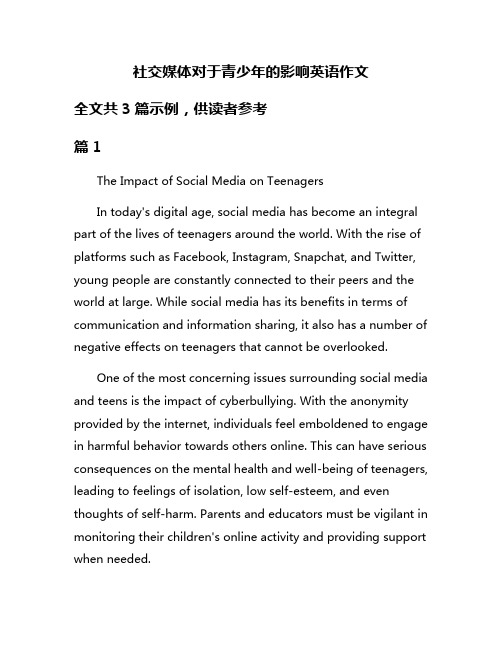
社交媒体对于青少年的影响英语作文全文共3篇示例,供读者参考篇1The Impact of Social Media on TeenagersIn today's digital age, social media has become an integral part of the lives of teenagers around the world. With the rise of platforms such as Facebook, Instagram, Snapchat, and Twitter, young people are constantly connected to their peers and the world at large. While social media has its benefits in terms of communication and information sharing, it also has a number of negative effects on teenagers that cannot be overlooked.One of the most concerning issues surrounding social media and teens is the impact of cyberbullying. With the anonymity provided by the internet, individuals feel emboldened to engage in harmful behavior towards others online. This can have serious consequences on the mental health and well-being of teenagers, leading to feelings of isolation, low self-esteem, and even thoughts of self-harm. Parents and educators must be vigilant in monitoring their children's online activity and providing support when needed.Another downside of social media for teenagers is the pressure to conform to unrealistic standards of beauty and success. With the proliferation of edited photos and carefully curated posts, young people are bombarded with images of perfection that can lead to feelings of inadequacy and poor body image. This can have a detrimental effect on their self-esteem and sense of self-worth, contributing to mental health issues such as anxiety and depression.Furthermore, social media can also negatively impact the social skills of teenagers. With the majority of communication taking place online, young people may struggle to develop meaningful relationships in the real world. In addition, constant scrolling through social media feeds can lead to a decrease in attention span and an inability to focus on tasks for extended periods of time. This can have a detrimental effect on academic performance and overall wellbeing.Despite these drawbacks, social media also has its benefits for teenagers. It provides a platform for young people to connect with others who share their interests and passions, fostering a sense of community and belonging. It also allows for the exchange of ideas and information on a global scale,empowering teens to engage in social activism and make a positive impact on the world around them.In conclusion, social media has both positive and negative effects on teenagers. While it can be a valuable tool for communication and self-expression, it also poses risks to their mental health and social development. It is essential for parents, educators, and policymakers to be aware of these issues and work together to create a safe and healthy online environment for young people to thrive. By promoting digital literacy and responsible online behavior, we can help mitigate the negative effects of social media on teenagers and empower them to make informed choices about their online interactions.篇2The Impact of Social Media on AdolescentsIn today's digital age, social media has become an integral part of the daily lives of adolescents. With the rise of platforms such as Facebook, Instagram, and Snapchat, teenagers are constantly connected to their peers and the world around them. While social media can have many positive impacts on adolescents, such as connecting them with friends and providinga platform for self-expression, it also comes with its own set of challenges and dangers.One of the most significant ways that social media impacts adolescents is through its influence on mental health. Studies have shown that excessive use of social media can lead to feelings of inadequacy, anxiety, and depression in teenagers. The constant comparison to others and pressure to present a perfect image online can take a toll on adolescents' self-esteem and overall mental well-being. Additionally, cyberbullying is a serious issue on social media, with many teenagers becoming victims of online harassment and cruelty.Furthermore, social media can also have a negative impact on adolescents' physical health. Spending too much time on social media can lead to a sedentary lifestyle, as teenagers may choose to spend hours scrolling through their feeds rather than engaging in physical activity. This can contribute to a host of health problems, including obesity, poor posture, and issues with sleep.In addition to its effects on mental and physical health, social media can also influence adolescents' academic performance. Research has shown that excessive use of social media can lead to distraction, decreased productivity, and poor academicoutcomes. With the constant notifications and updates on social media, teenagers may struggle to focus on their schoolwork and retain information.Despite these challenges, social media also has its benefits for adolescents. It provides a platform for teenagers to connect with friends, share their thoughts and experiences, and explore their interests. Social media can also be a valuable tool for learning and communication, with many educational resources available online.To mitigate the negative impacts of social media on adolescents, it is important for parents, educators, and policymakers to take proactive measures. Encouraging teenagers to limit their screen time, engage in offline activities, and practice healthy digital habits can help protect their mental and physical well-being. Additionally, promoting positive online behavior, teaching digital literacy skills, and providing resources for dealing with cyberbullying can help create a safer and healthier online environment for adolescents.In conclusion, social media has a significant impact on adolescents, both positive and negative. While it can provide valuable opportunities for connection and expression, it also presents challenges that can affect teenagers' mental, physical,and academic well-being. By promoting responsible digital usage and supporting adolescents in navigating the complexities of social media, we can help ensure that they are able to harness the benefits of these platforms while protecting their overall health and well-being.篇3The Impact of Social Media on TeenagersIntroductionSocial media has become an integral part of our daily lives, with billions of users worldwide. However, its impact on teenagers has been a topic of discussion and concern. In this essay, we will explore the positive and negative effects of social media on teenagers and provide some recommendations for parents and guardians to help teenagers navigate the digital world responsibly.Positive EffectsSocial media offers teenagers a platform to connect with their peers and share their thoughts, ideas, and experiences. It helps them build and maintain friendships, especially in a world where physical interactions are limited. Social media also allows teenagers to express themselves creatively through photos,videos, and posts, fostering their self-confidence andself-expression.Furthermore, social media provides teenagers with access to a wealth of information and resources, helping them stay informed about current events, trends, and issues. It can also serve as a platform for learning, with educational content available on various platforms, enabling teenagers to explore new interests and expand their knowledge.In addition, social media can be a source of support and encouragement for teenagers facing challenges such as mental health issues, bullying, or peer pressure. Online communities and resources provide a safe space for teenagers to seek advice, guidance, and solidarity, helping them cope with difficult situations.Negative EffectsDespite its many benefits, social media can have negative effects on teenagers as well. One of the most concerning issues is the impact of social media on mental health. Studies have shown that excessive use of social media can lead to feelings of loneliness, anxiety, depression, and low self-esteem among teenagers. The constant comparison to others and the pressureto present a perfect image online can take a toll on teenagers' mental well-being.Moreover, social media can expose teenagers to cyberbullying, online harassment, and negative influences. The anonymity and distance of the digital world can embolden individuals to engage in hurtful behavior, leading to emotional distress and psychological harm for the victims. Teenagers may also be exposed to inappropriate content, misinformation, and harmful ideologies on social media, influencing their beliefs and behavior in negative ways.Furthermore, excessive use of social media can disrupt teenagers' sleep patterns, studies, and relationships. The addictive nature of social media can lead to decreased academic performance, reduced social interactions, and poor mental and physical health. The constant distractions and notifications from social media can hinder teenagers' ability to focus, concentrate, and engage in meaningful activities offline.Recommendations for Parents and GuardiansTo help teenagers navigate the impact of social media responsibly, parents and guardians can take the following steps:1. Encourage open communication: Create a supportive and non-judgmental environment for teenagers to share their experiences, concerns, and interests related to social media. Listen actively, validate their feelings, and offer guidance and advice when needed.2. Set boundaries and limits: Establish clear rules and guidelines for teenagers' use of social media, including time limits, content restrictions, and privacy settings. Monitor their online activities, engage in conversations about online safety, and address any issues that may arise.3. Promote a healthy balance: Encourage teenagers to engage in a variety of activities beyond social media, such as sports, hobbies, and socializing in person. Help them prioritize their well-being and self-care, including offline interactions, physical exercise, and mental health support.4. Educate about online risks: Teach teenagers about the potential risks and dangers of social media, including cyberbullying, privacy concerns, and harmful content. Empower them with the knowledge and skills to protect themselves online, recognize warning signs, and seek help when needed.ConclusionIn conclusion, social media has a significant impact on teenagers, both positive and negative. While it offers valuable opportunities for connection, creativity, and learning, it also poses risks to mental health, safety, and well-being. By understanding the effects of social media and taking proactive steps to support teenagers, parents and guardians can help them navigate the digital world responsibly and develop healthy habits for the future.。
高中英语信息技术支持下的课堂应注意的问题
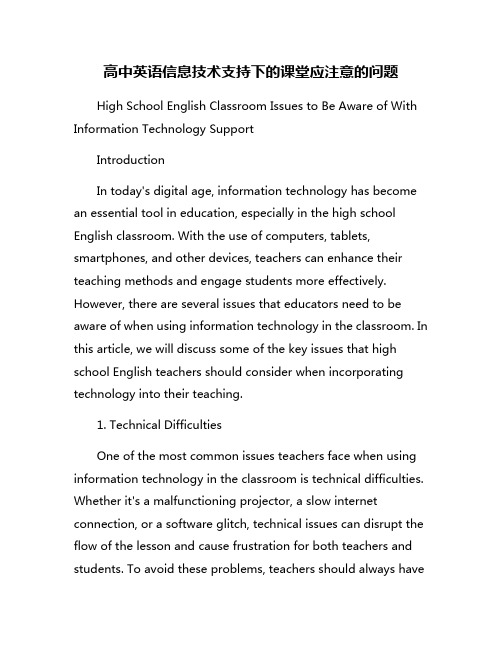
高中英语信息技术支持下的课堂应注意的问题High School English Classroom Issues to Be Aware of With Information Technology SupportIntroductionIn today's digital age, information technology has become an essential tool in education, especially in the high school English classroom. With the use of computers, tablets, smartphones, and other devices, teachers can enhance their teaching methods and engage students more effectively. However, there are several issues that educators need to be aware of when using information technology in the classroom. In this article, we will discuss some of the key issues that high school English teachers should consider when incorporating technology into their teaching.1. Technical DifficultiesOne of the most common issues teachers face when using information technology in the classroom is technical difficulties. Whether it's a malfunctioning projector, a slow internet connection, or a software glitch, technical issues can disrupt the flow of the lesson and cause frustration for both teachers and students. To avoid these problems, teachers should always havea backup plan in case technology fails, such as printed materials or alternative activities.2. Security and Privacy ConcernsWith the increasing use of technology in the classroom, there are concerns about security and privacy. Teachers need to be cautious when using online platforms and tools that require students to create accounts or share personal information. It's essential to educate students about internet safety and encourage them to use strong passwords and be mindful of what they share online.3. Digital DistractionsWhile technology can enhance learning, it can also be a source of distraction for students. Social media, messaging apps, and online games can tempt students to veer off task during lessons. Teachers should establish clear rules and expectations for technology use in the classroom and monitor students' online activities to ensure they stay focused on the lesson.4. Accessibility and EquityNot all students have equal access to technology at home, which can create disparities in learning opportunities. Teachers should be mindful of students who may not have access todevices or the internet outside of school and provide alternative resources to ensure all students can participate in online activities. Additionally, teachers should consider the needs of students with disabilities and make accommodations to ensure they can fully engage with technology in the classroom.5. Digital LiteracyAs technology evolves, students need to develop digital literacy skills to navigate the digital world effectively. Teachers should integrate digital literacy instruction into their lessons to help students learn essential skills such as evaluating online sources, protecting their online privacy, and using technology responsibly. By teaching students how to use technology safely and ethically, teachers can empower them to become responsible digital citizens.ConclusionIn conclusion, information technology can be a valuable tool for enhancing learning in the high school English classroom. However, teachers need to be aware of the potential issues that can arise when using technology and take steps to address them proactively. By addressing technical difficulties, promoting security and privacy, minimizing digital distractions, ensuring accessibility and equity, and teaching digital literacy skills,teachers can create a safe and inclusive learning environment where technology enhances rather than detracts from learning.。
尊重隐私为艺的英语作文
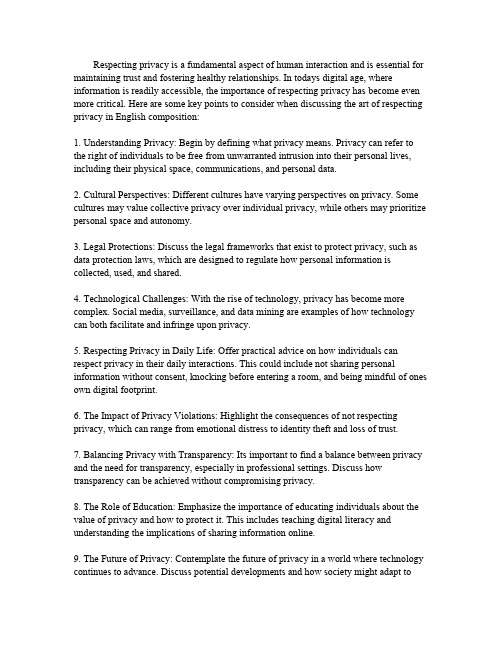
Respecting privacy is a fundamental aspect of human interaction and is essential for maintaining trust and fostering healthy relationships.In todays digital age,where information is readily accessible,the importance of respecting privacy has become even more critical.Here are some key points to consider when discussing the art of respecting privacy in English composition:1.Understanding Privacy:Begin by defining what privacy means.Privacy can refer to the right of individuals to be free from unwarranted intrusion into their personal lives, including their physical space,communications,and personal data.2.Cultural Perspectives:Different cultures have varying perspectives on privacy.Some cultures may value collective privacy over individual privacy,while others may prioritize personal space and autonomy.3.Legal Protections:Discuss the legal frameworks that exist to protect privacy,such as data protection laws,which are designed to regulate how personal information is collected,used,and shared.4.Technological Challenges:With the rise of technology,privacy has become more complex.Social media,surveillance,and data mining are examples of how technology can both facilitate and infringe upon privacy.5.Respecting Privacy in Daily Life:Offer practical advice on how individuals can respect privacy in their daily interactions.This could include not sharing personal information without consent,knocking before entering a room,and being mindful of ones own digital footprint.6.The Impact of Privacy Violations:Highlight the consequences of not respecting privacy,which can range from emotional distress to identity theft and loss of trust.7.Balancing Privacy with Transparency:Its important to find a balance between privacy and the need for transparency,especially in professional settings.Discuss how transparency can be achieved without compromising privacy.8.The Role of Education:Emphasize the importance of educating individuals about the value of privacy and how to protect it.This includes teaching digital literacy and understanding the implications of sharing information online.9.The Future of Privacy:Contemplate the future of privacy in a world where technology continues to advance.Discuss potential developments and how society might adapt tomaintain privacy.10.Conclusion:End with a strong statement about the importance of respecting privacy and the role it plays in creating a respectful and secure society.By addressing these points,your essay will provide a comprehensive view of the art of respecting privacy,emphasizing its significance in modern society and offering insights into how it can be upheld effectively.。
关于学生玩手机的英语作文
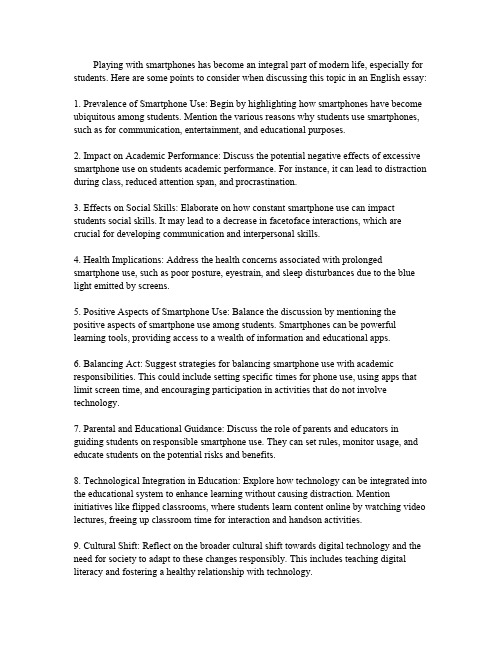
Playing with smartphones has become an integral part of modern life,especially for students.Here are some points to consider when discussing this topic in an English essay:1.Prevalence of Smartphone Use:Begin by highlighting how smartphones have become ubiquitous among students.Mention the various reasons why students use smartphones, such as for communication,entertainment,and educational purposes.2.Impact on Academic Performance:Discuss the potential negative effects of excessive smartphone use on students academic performance.For instance,it can lead to distraction during class,reduced attention span,and procrastination.3.Effects on Social Skills:Elaborate on how constant smartphone use can impact students social skills.It may lead to a decrease in facetoface interactions,which are crucial for developing communication and interpersonal skills.4.Health Implications:Address the health concerns associated with prolonged smartphone use,such as poor posture,eyestrain,and sleep disturbances due to the blue light emitted by screens.5.Positive Aspects of Smartphone Use:Balance the discussion by mentioning the positive aspects of smartphone use among students.Smartphones can be powerful learning tools,providing access to a wealth of information and educational apps.6.Balancing Act:Suggest strategies for balancing smartphone use with academic responsibilities.This could include setting specific times for phone use,using apps that limit screen time,and encouraging participation in activities that do not involve technology.7.Parental and Educational Guidance:Discuss the role of parents and educators in guiding students on responsible smartphone use.They can set rules,monitor usage,and educate students on the potential risks and benefits.8.Technological Integration in Education:Explore how technology can be integrated into the educational system to enhance learning without causing distraction.Mention initiatives like flipped classrooms,where students learn content online by watching video lectures,freeing up classroom time for interaction and handson activities.9.Cultural Shift:Reflect on the broader cultural shift towards digital technology and the need for society to adapt to these changes responsibly.This includes teaching digital literacy and fostering a healthy relationship with technology.10.Conclusion:Conclude the essay by summarizing the key points and emphasizing the importance of finding a balance between the benefits and drawbacks of smartphone use among students.Remember to use a variety of sentence structures and vocabulary to make your essay engaging and wellrounded.Provide examples and,if possible,cite research or studies to support your arguments.。
人工智能时代教师角色与思维的转变英语作文
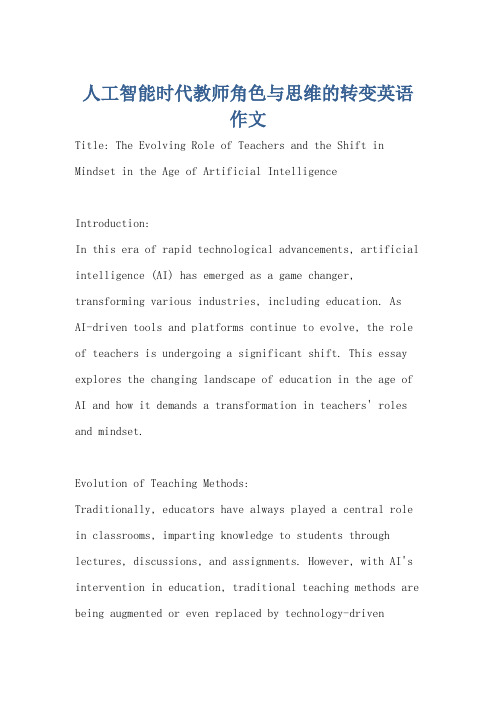
人工智能时代教师角色与思维的转变英语作文Title: The Evolving Role of Teachers and the Shift in Mindset in the Age of Artificial IntelligenceIntroduction:In this era of rapid technological advancements, artificial intelligence (AI) has emerged as a game changer, transforming various industries, including education. AsAI-driven tools and platforms continue to evolve, the role of teachers is undergoing a significant shift. This essay explores the changing landscape of education in the age of AI and how it demands a transformation in teachers' roles and mindset.Evolution of Teaching Methods:Traditionally, educators have always played a central role in classrooms, imparting knowledge to students through lectures, discussions, and assignments. However, with AI's intervention in education, traditional teaching methods are being augmented or even replaced by technology-drivensolutions. Virtual classrooms powered by AI algorithms now offer personalized learning experiences tailored to individual students' needs. Consequently, teachers are becoming facilitators rather than mere distributors of information.The Emergence of Intelligent Tutoring Systems (ITS):One aspect that showcases the evolving role of teachers is the emergence of intelligent tutoring systems (ITS). These adaptive learning technologies leverage AI algorithms to provide personalized instruction dynamically based on each student's strengths and weaknesses. With ITS at their disposal, teachers can concentrate more on addressing students' higher-order thinking skills such as critical thinking and problem-solving while machines handle repetitive tasks such as grading assignments or conducting assessments.Teachers Embracing Learner-Centered Approaches:As AI takes over routine administrative tasks, there is an increasing focus on learner-centered pedagogies that emphasize holistic development rather than rotememorization. Modern educators recognize that teaching goes beyond delivering content; it involves nurturing students' curiosity, creativity, and digital literacy skills. Teachers are adapting their practices to create student-centered environments that foster collaboration, self-directed learning, and critical thinking abilities.Cultivating Digital Literacy Skills:With technology embedded deeply into our lives today, cultivating digital literacy skills has become essential. Educators must not only possess a strong foundational knowledge of AI but also be adept at integrating AI tools into the curriculum effectively. Teachers should guidetheir students in navigating the vast sea of information available online, helping them evaluate sources critically and fostering responsible digital citizenship.Fostering Emotional Intelligence:While AI can support academic growth, it is unable to replicate human traits such as empathy, emotional support, and social interaction. Therefore, teachers must emphasize developing emotional intelligence in students alongsideacademic growth. By creating inclusive classrooms that promote understanding, tolerance, and respect for diversity, educators play a pivotal role in preparing students for an interconnected world ruled by both humans and machines.Conclusion:As artificial intelligence becomes increasingly integrated into education, the role of teachers is undergoing a transformative shift. With the rise of intelligent tutoring systems and learner-centered approaches, teachers are evolving into facilitators who empower students to become lifelong learners with critical thinking skills.Cultivating digital literacy abilities and emotional intelligence will ensure that educators remain central figures in molding future generations amidst the AI-driven revolution. Embracing these challenges and adapting to new opportunities will define the success of teachers in theage of artificial intelligence.Word count: 437 words。
英语作文al写作
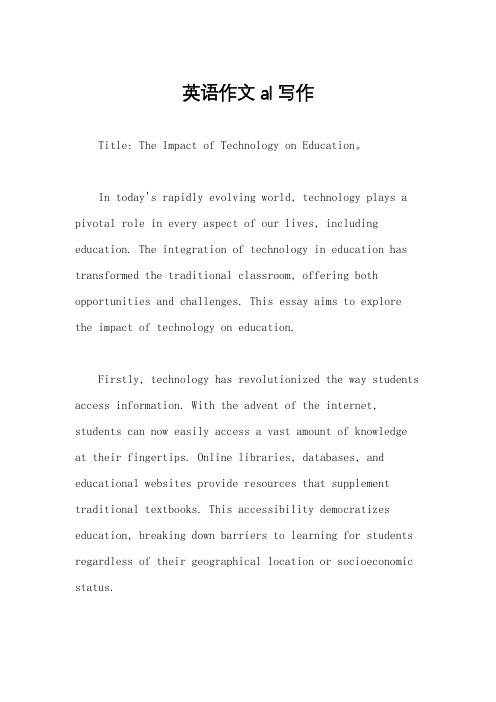
英语作文al写作Title: The Impact of Technology on Education。
In today's rapidly evolving world, technology plays a pivotal role in every aspect of our lives, including education. The integration of technology in education has transformed the traditional classroom, offering both opportunities and challenges. This essay aims to explore the impact of technology on education.Firstly, technology has revolutionized the way students access information. With the advent of the internet, students can now easily access a vast amount of knowledge at their fingertips. Online libraries, databases, and educational websites provide resources that supplement traditional textbooks. This accessibility democratizes education, breaking down barriers to learning for students regardless of their geographical location or socioeconomic status.Moreover, technology has enhanced the learning experience through multimedia tools. Interactive simulations, videos, and educational games make learning more engaging and enjoyable for students. These multimedia resources cater to different learning styles, allowing students to grasp complex concepts more effectively. For example, visual learners may benefit from interactive diagrams, while auditory learners may prefer video lectures.Furthermore, technology facilitates personalizedlearning experiences. Adaptive learning software andartificial intelligence algorithms analyze students'learning patterns and provide customized learning paths. This individualized approach allows students to learn at their own pace and focus on areas where they need improvement. Additionally, educational apps and platforms offer opportunities for self-directed learning, empowering students to take control of their education outside the classroom.However, the integration of technology in educationalso poses challenges. One of the major concerns is thedigital divide, referring to the gap between those who have access to technology and those who do not. Despite efforts to bridge this gap, disparities in access to technology persist, particularly in underserved communities. As a result, students without access to technology may be at a disadvantage compared to their peers.Moreover, the overreliance on technology can lead to reduced face-to-face interaction in the classroom. While technology enhances certain aspects of learning, it cannot replace the value of human interaction and collaboration. Excessive screen time may also have negative effects on students' health and well-being, such as eye strain and sedentary behavior.Additionally, there are concerns about the quality of online content and the proliferation of misinformation. With the abundance of information available online, it becomes crucial for students to develop critical thinking skills to discern credible sources from unreliable ones. Educators play a vital role in teaching digital literacy skills and guiding students in navigating the vast sea ofinformation on the internet.In conclusion, technology has significantly impacted education, revolutionizing the way students learn and access information. While technology offers numerous benefits, such as increased accessibility and personalized learning experiences, it also presents challenges,including the digital divide and concerns about the quality of online content. As we continue to embrace technology in education, it is essential to strike a balance and ensure that all students have equal opportunities to harness the power of technology for learning and growth.。
教师信息素养名词解释
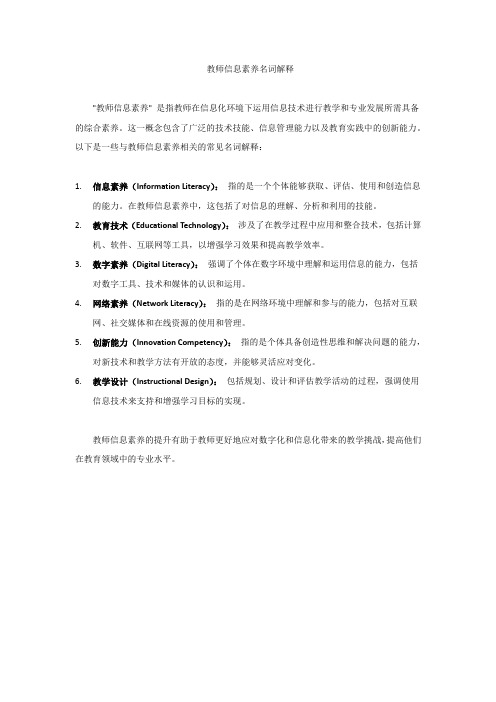
教师信息素养名词解释
"教师信息素养" 是指教师在信息化环境下运用信息技术进行教学和专业发展所需具备的综合素养。
这一概念包含了广泛的技术技能、信息管理能力以及教育实践中的创新能力。
以下是一些与教师信息素养相关的常见名词解释:
1.信息素养(Information Literacy):指的是一个个体能够获取、评估、使用和创造信息
的能力。
在教师信息素养中,这包括了对信息的理解、分析和利用的技能。
2.教育技术(Educational Technology):涉及了在教学过程中应用和整合技术,包括计算
机、软件、互联网等工具,以增强学习效果和提高教学效率。
3.数字素养(Digital Literacy):强调了个体在数字环境中理解和运用信息的能力,包括
对数字工具、技术和媒体的认识和运用。
4.网络素养(Network Literacy):指的是在网络环境中理解和参与的能力,包括对互联
网、社交媒体和在线资源的使用和管理。
5.创新能力(Innovation Competency):指的是个体具备创造性思维和解决问题的能力,
对新技术和教学方法有开放的态度,并能够灵活应对变化。
6.教学设计(Instructional Design):包括规划、设计和评估教学活动的过程,强调使用
信息技术来支持和增强学习目标的实现。
教师信息素养的提升有助于教师更好地应对数字化和信息化带来的教学挑战,提高他们在教育领域中的专业水平。
